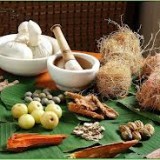
Ayurveda and Vedas/ Upavedas
Ayurveda and Vedas/ Upavedas
The Upavedas supplement the Vedas with more specific applications of Vedic teachings into the cultural field. Ayurveda arose as a secondary Veda or Upaveda generally connected with the Atharva Veda. This is because the Atharva Veda first presents specific mantras and methods for treating various diseases. However, Ayurveda is connected with the other Vedas, which are all concerned with self-knowledge and internal integration. It has a close connection with Yajur Veda which describes the Vedic ritual aimed at healing both the Cosmic Being and the individual soul.[iii]
The Upavedas are:
1. Ayurveda — healing arts
2. Dhanur Veda — martial arts
3. Sthapatya Veda — architecture, sculpture and geomancy
4. Gandharva Veda — music, poetry and dance
Ayurveda is closely connected with all the Upavedas. It relies upon Dhanur Veda or the martial arts for exercise recommendations and styles of massage and body work, particularly the treatment of the marmas or sensitive points on the body. The marmas are mainly described in Dhanur Veda. Many yoga asanas also reflect the insights of Dhanur Veda.
Ayurveda employs Gandharva Veda for its subtle therapies of music and art, which are very important in healing both mind and body. Yogas of music and sound develop out of Gandharva Veda.
Sthapatya Veda, more commonly called Vastu, shows the right design of structures to bring in wholesome earth and spatial energies. This is essential for the proper orientation and construction of clinics, hospitals, and healing rooms. Some people may suffer from disease mainly due to the fact that the wrong construction of their houses exposes them to harmful directional forces. For this reason, many ayurvedic doctors will question patients on how their house is situated as part of their diagnosis. Yoga uses Vastu for the orientation of temples, ashrams and meditation rooms. For example, the yogic recommendation to meditate facing east or north reflects the considerations of Vas
Author: Vamadev Shastri
Acharya Pandit Vamadev Shastri ( David Frawley) is an American Hindu author, publishing on topics such as Hinduism, Yoga and Ayurveda. David Frawley is an expert in ayurveda, Vedic astrology, yoga, and tantra, all of which, he says, have their basis in Vedanta. Indeed it is the interdisciplinary approach to Vedanta that he sees as his particular contribution in demystifying eastern spirituality. David Frawley has written a number of books on all these disciplines, including Yoga and Vedanta, and Ayurveda and the Mind. His Vedic translations and historical studies on ancient India have received much acclaim, as have his journalistic works on modern India. Pandit Vamadeva Shastri was also the founder and the first president of the American Council of Vedic Astrology from 1993-2003. He is also a Patron Founder of the British Association of Vedic Astrology.
(1489)
Latest posts by Vamadev Shastri (see all)
- Vedic Dawn : The Spiritual Reawakening – November 13, 2012
- The Four Vedas – November 21, 2011
- The Six Schools of Vedic Insight – November 20, 2011


